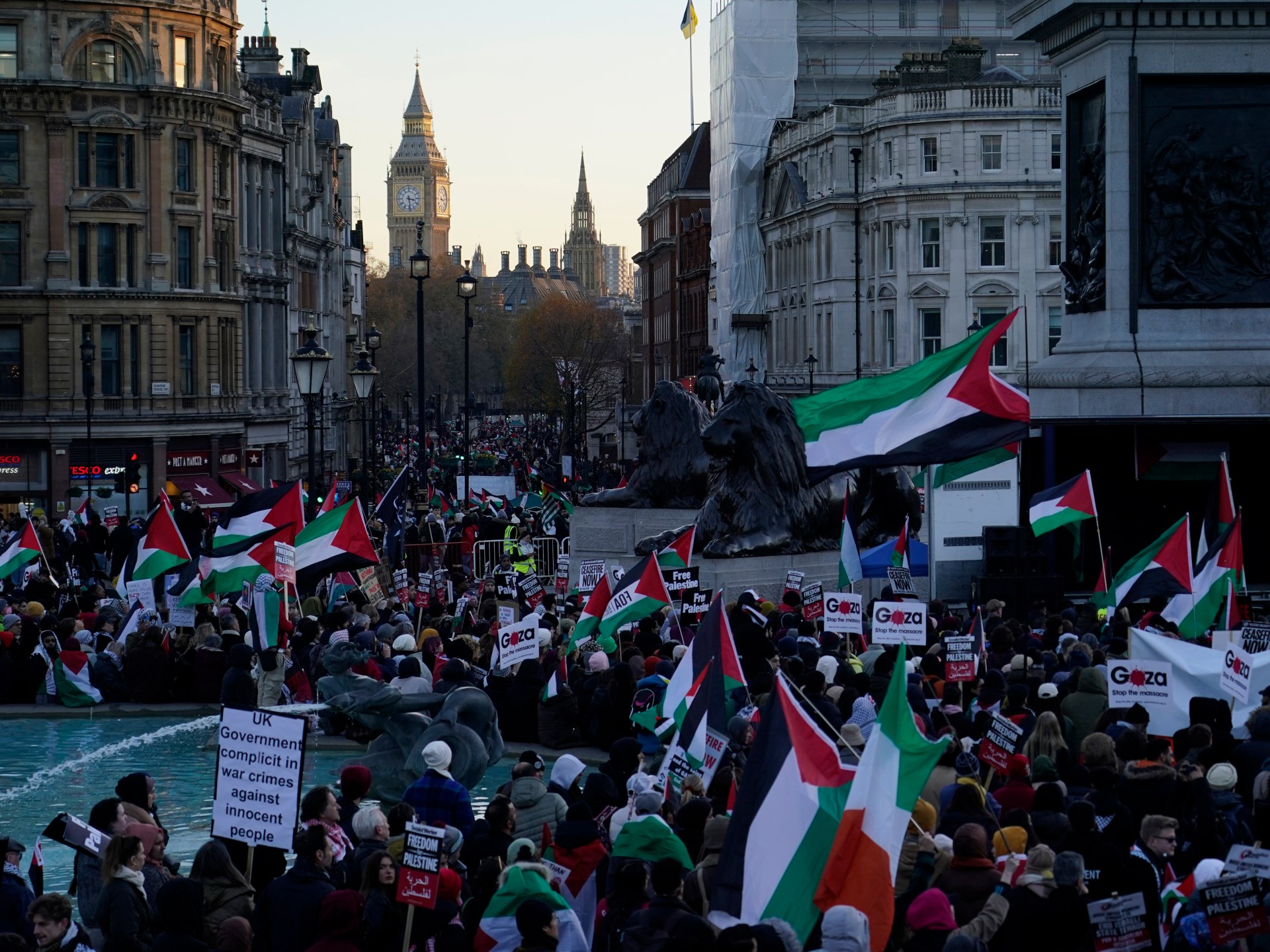
London, United Kingdom – During a visit to Tel Aviv in mid-October, British Prime Minister Rishi Sunak stood next to his Israeli counterpart Benjamin Netanyahu, who launched a devastating war against Gaza following Hamas attacks on southern Israel on October 7. “We want you to win,” Sunak told Netanyahu in front of the cameras.
More than two months later, the UK’s support for Israel’s war has remained largely unwavering, even as Israeli bombs and artillery fire have killed more than 21,000 Palestinians in Gaza, including more than 8,000 children.
But whatever a “victory” for Israel looks like, Sunak’s Conservative Party and the opposition Labor Party, whose leader Keir Starmer has also supported Netanyahu’s war, have both lost voters like Ala Sirriyeh, a sociology lecturer at Lancaster University.
“It showed very clearly who they are willing to throw under the bus to get elected, whose well-being is important and whose well-being is not,” she told Al Jazeera. “As a Palestinian, I feel completely alienated from the major political parties [in the UK] and will not be voting for either of them in the near future.”
She is not alone. As Israel continues to bomb Palestinians in Gaza, a coalition of political groups, workers’ unions, studentsIn the United Kingdom, health professionals, journalists, writers and ordinary people from all walks of life have organized and urged their political leadership to call for a ceasefire. Day after day, demonstrators occupied public squares and weapons factories and marched through city centers and university campuses. Thousands of people have signed petitions calls for a ceasefire.
But as leaders of both major parties maintain their support for Israel, they face a particular credibility crisis among British Muslims, who make up 6.7 percent of the population and traditionally vote overwhelmingly for the Labor Party.
“It is deeply disturbing to see these calls for a ceasefire being ignored or suppressed,” Sirriyeh said.
In one Opinion poll In the study of 30,000 Muslim respondents conducted at the end of October by the UK-based organization Muslim Census, only 5 percent of respondents said they would vote for Labor in the next general election. This is much lower compared to 71 percent of British Muslims who voted for the party in 2019. The Conservative Party, which received 9 percent of the Muslim vote in 2019, would receive less than 1 percent of the votes of people surveyed in this poll.
In another Opinion poll Of 1,032 Muslims in the UK, more than two thirds expressed dissatisfaction with the British government’s response to the Israeli attack on Gaza. Almost half of respondents expressed similar views on Starmer’s approach to the crisis, although a majority still supported the Labor Party.
And it’s not just Muslims in the UK. In a YouGov survey of general public sentiment published on November 15, a third of respondents said the British government should oppose Israel’s war and push for a ceasefire. Another quarter of participants called for a limited ceasefire. Only 9 percent opposed any kind of ceasefire while supporting Israel’s military goals.
“I have seen that the conversation and perceptions on this issue have shifted significantly in favor of Palestine,” Arooj, a teacher in her 20s who has taken part in protest rallies, told Al Jazeera. Arooj said she was uncomfortable revealing her full name at a time when many pro-Palestinian protesters have been attacked at their workplaces.
However, even a month after that poll, British Foreign Secretary David Cameron refused to support an immediate ceasefire in an editorial co-authored with his German counterpart Annalena Baerbock. “We do not believe that calling for a general and immediate ceasefire now and hoping that it somehow becomes permanent is the right way,” they wrote, blaming Hamas for the crisis.
Starmer also refused to support a complete end to the fighting in Gaza, instead calling for a “sustainable ceasefire,” a formulation that Tayib Ali, the director of the U.K.-based International Center for Justice for Palestinians, called “weak and watered down.” designated call”.
During a parliamentary vote on a ceasefire resolution put forward by the Scottish Nationalist Party, Starmer threatened Labor members with expulsion if they voted for it. The Labor leader had previously supported Israel’s decision to withhold water and electricity from Gaza in a radio interview.
Meanwhile, United Nations experts and leading human rights groups have warned that Israel is likely committing war crimes and that its actions could amount to genocide South Africa claimed in a case before the International Court of Justice.
Sirriyeh said she believed the Labor leadership’s reluctance to criticize Israel was due to fears that allegations of anti-Semitism could be used as a weapon against the party. “Given criticism leveled at the Labor Party during Jeremy Corbyn’s leadership over the party’s failure to address alleged anti-Semitism within its ranks, there are concerns among politicians about calling for a ceasefire and denouncing Israeli war crimes,” she said.
Starmer faced a revolt from parts of his party over his stance. Imran Hussain, an MP and shadow minister, said in his resignation letter to Starmer that a ceasefire was essential to end the suffering of the people of Gaza. Accusing Israel of committing war crimes and collective punishment, Hussain wrote: “The situation in Gaza has now become more than a humanitarian catastrophe.”
At least 23 Labor councilors condemned Starmer’s support for Israel’s policy of depriving Gaza of water and electricity and left the party. Shaista Aziz, one of them, wrote that the Labor leader had “appallingly advocated the collective punishment of Palestinians in Gaza.”
But Arooj sees the future of pro-Palestinian solidarity in the UK in the streets, in the form of young people – including schoolchildren – who have marched against the war. Polls show that younger people in the UK clearly support Palestine. “The younger generation gives me hope,” she said.






Recent Comments